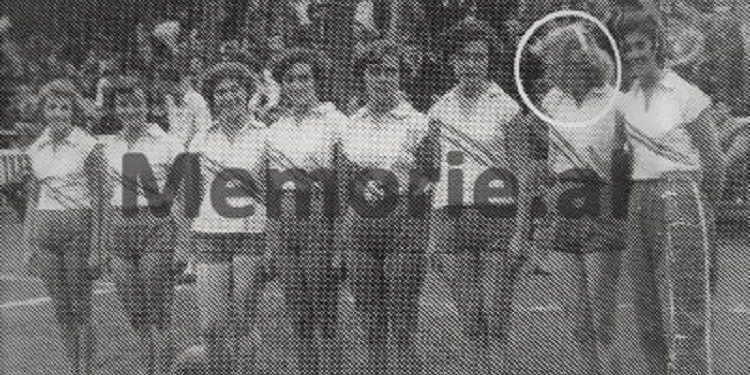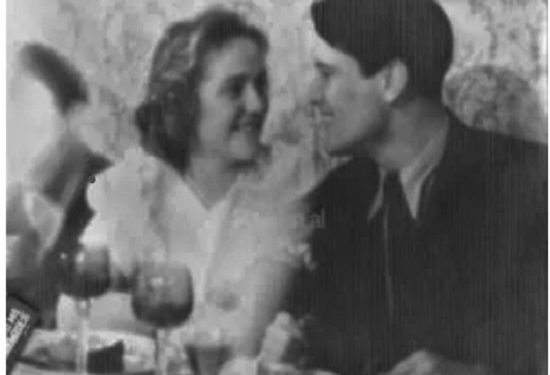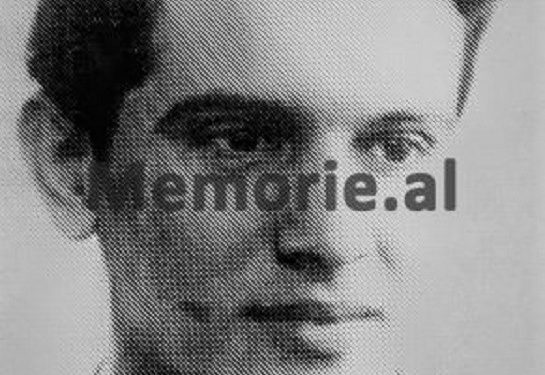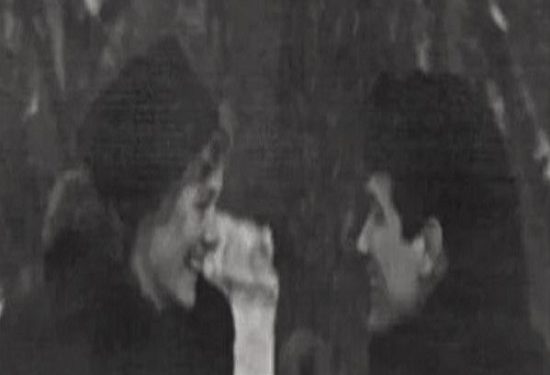-Irina, the Russian who came to Albania to pursue love with the Albanian engineer, the story that continued even after the shooting…!-
Memorie.al / Once she came to Albania to follow her, her great love. Many years later, he would return to Albania again, because his remains are here, and he is still looking for them. By reversing the actions, the cinema has concretized a great desire of humanity that, indeed, will always be out of reach to become a mere exhausting exercise of the mind that goes back to the past, tries to remember, recreate, without still managing to materialize anything.
This is also the case with Irina Sallak, the Russian woman married to the engineer from Tirana who often thinks back to the last time she saw her husband. It was the usual morning of a day that would not be ordinary at all. Xhaviti lived in Fier for a year. They had transferred him, according to what was said, after a meeting where they had reminded him of the two brothers in prison and had asked him to break up with the Russian woman, a request which he had not accepted.
At that time, he was leading the construction of the Oil Refinery in Ballsh, as he had done with the Berat Textile Combine, but when the construction of the Refinery was completed, the chief engineer was transferred to Fier’s NSHN. Xhaviti had been married for 20 years to the Russian woman and the brothers had been arrested 10 years ago, so this measure in 1975 could not be justified with these two problems of the biography, but the party knew everything: it decided and the others obeyed, with willingly or not, until the most extreme decision, such as the shooting for Xhavit, was taken in March 1977.
However, that April morning, Irina did not know what would happen to her husband, the man of her heart, for whom she had left her mother and Russia; for which, he had not thought for a single moment, returning to his homeland in 1960, when the relations between the two states were broken; which, now that the girls were in university, he had followed in Fier, after years of being away, due to his duties in one city and another.
They had exchanged houses with a family that was moving from Fieri to Tirana, and she had found a job in the Municipality, in the “Kastriot” neighborhood of the city. The 40-year-olds were living alone, perhaps for the first time since they met in the summer of 1950, at a student summer camp in Russia. After the marriage there, Xhaviti, having finished his studies, had returned to Albania, where Irina came sometime later, together with the 5-month-old twins, who were born in Saint-Petersburg.
He would live in a house with 13 people, in Xhaviti’s big family and then, in their house in New Tirana, but in 1965, Xhaviti went to Berat and for 10 years he would be further away than near. The year 1975, although it had the heavy shadow of a strange transfer, was also a time when they were finally living together and that morning was one of those mornings of the week when Irina left early for work and left him Xavitin at home.
When they were greeted, he was brushing his teeth. An ordinary scene, a slippery image, where there was no reason to stop, a door closing, not thinking about what was left behind…! So it was for Irina. She didn’t know that that scene would never happen again, that that image was the last one she would have of her husband, that what she left behind the door, she would never find there or anywhere else. So it returns to that scene, and that scene, returns to it without being able to be anything else, only an intangible, painful image.
Invited in 2009, together with her twin daughters, (Vera and Elena), in the program “Histori me zhurmues” by Pandi Laço, on TV Klan, Irina told about the last time she saw Xhavit, not holding back emotions even though more than 30 years had passed since that day, because that morning becomes the point where all the longing, all the hostages, all the questions that echo without answers like an opening missing in that moment that will always remain without hug
During the program, she and her daughters told the story they know of Xhav Sallak’s arrest and conviction, which contains many mysteries that have yet to be clarified. They never learned the reason for Xhavit’s arrest, they only answered with “the Party knows”; were never allowed to see him after his arrest; they received the same “the party knows”, also as an explanation for his execution by firing squad and they never learned, on what date he was fired and where he was buried.
“The last time, when I brought the clothes and food, the one who accepted them, his name was Bajram, said to me: “Wait a minute”. At the gate, we passed in turn, handed over our things and left. I waited. He said that the trial was done and he was sentenced to death and you can take these things back. “What was he sentenced for?” I asked her. “The party knows”! “Long lives the Party”, I said. The disconnect between what people felt and what people said could go so far. Now Irina would return to her life as a shadow of herself. A good part of who she was had been killed as well.
Even later, searching through the documents, they could not learn anything accurate. Officially, Xhaviti is accused: “for the crime of treason against the Motherland, economic sabotage and agitation and propaganda against the People’s Power”.
“When I was in the investigator, I was held firmly by the very strong belief in the man, that he has never done anything bad. He could never do wrong, a workaholic as he was when assigned a job. Even after he was convicted, I couldn’t get over the fact that he didn’t do anything. If you want to hang me here, I’ll still say this word, what I feel”, said Irina in the program “Histori me louisvier”. Xhaviti was not even one of those who spoke against the government.
He, his wife, his daughters, had always stayed inside the frames, not to give anyone a reason to look at them with suspicion, but even that would not help. “The heart has its reasons, which even reason does not know”, said Blaise Pascal. In Albania, for almost 50 years, instead of the heart, it was the Party. And the state under the leadership of this party had its own reasons for not documenting the shooting of Xhav Sallak. The family still does not know the date of his death. “Three certificates we received, all three are of different dates”, says Elena.
The trial, with closed doors, took place on March 25, 1977, on May 31 of that year, the Presidium of the People’s Assembly refused to spare Xhav Sallak and four other convicts, including former ministers Abdyl Këllezi and Koço Theodhosi. The shooting normally happened afterwards, but when is not yet known. Meanwhile, the news of the heavy punishment also reached Tirana, where Elena and Vera were studying.
“Immediately, the party secretary of the English branch announced that I would be expelled within 10 days. It was a big gathering; I was in my second year. The secretary went and said that; you have a Russian mother and you are filled with revisionist ideas and you stayed so wise in school, to throw ashes in our eyes, but you are not worthy to be in our faculty”, remembers Elena, whose defense, before the entire English department at the Faculty of Foreign Languages, it would be useless and she would immediately return to Fier to her mother, without finishing her second year.
Meanwhile, Vera went to inform the faculty herself. A smaller gathering was held, with just her Dentistry course, but it seems the attacks didn’t work and she was only dropped from the youth organization. “In the second year, they didn’t remove me, but they found professors to keep me in class. In the subject of political economy, the party secretary of the entire university comes to me in the exam.
I answered well. He said to me: Now tell me what Comrade Enver said in the newspaper dated July 6 of one year, many years ago. I felt that I failed and in my notebook I got a 4. In the fall I took the exam and I did very well. However, everything was decided. They took me out of school without much fanfare. They called me in the morning, they said: You know the reason; we removed you from the faculty. I also returned to Fier, where my sister was too,” says Vera.
They stayed in Fier for two years. After the shooting of Xhavit, and why they were told that they would be deported, they did not leave them immediately. It was a time of anxiety, even more difficult than that of exile. “When they told us about the shooting, they told us that we would be interned, but they kept us in Fier for two years. Those were the most difficult years. The three of us had many provocations, both mother and us. The two years that I stayed in Fier, I worked in Reclamation of Fier.
I started work at 5.00 in the morning and with a brigade that had only men, I had to get in the car and go to every village in Fier. Until 1978. In 1978, we were interned in Sheq-Marinas. 5 years “moderately”, that is, we appealed in the morning, before going to work and in the evening. We were working in the field. In separate brigades. There were many other interned families. We didn’t even have the right to go to the neighboring village. If we passed it, the prison was up to 3 years. We had to get permission from the local police or the council president”, says Elena.
It was the same for Vera. She, who had studied dentistry, had to work in agriculture and carry 45 kilo bags on her back. “It was a case. There were 6 interned girls and they came quietly with bags of manure and the cart driver started unloading them at the beginning of the field where we were going to throw manure and we said to him: “Why did you empty them there? Put it at the top of every plot”. “No, he said, it is a sin for the oxen to torture them” We should do the work of the oxen as well”.
After five years, they continued to be deported “without measure”, but there was no hope for them, until in 1988, some foreign women began to be allowed to return to their country again. Then, Irina also prayed to return to Russia and for the first time, after so many years, they received a positive answer. The three left for St. Petersburg, where they lived for 19 years, but then it was Irina who decided to return. “Here we had left this big problem, the problem of the husband, but also the close people who loved us and many good people who treated us well”, said Irina in 2009, and that problem has not been solved yet.
A few years later, in an article in a daily in Tirana, the story of Xhav Sallak is mentioned again. His wife and daughters are still searching for the remains. As AFP says, the remains of 13 people were found on a mountain slope in Tirana. It is suspected that among them are those of the two engineers shot in June 1977, Koço Plakut and Xhavit Sallakut.
Elena and Vera have given their DNA samples to the International Commission on Missing Persons (ICMP), which has launched a project to identify the missing from the communist regime in Albania, awaiting an answer, pending of an opportunity to have, after so many years, a place to put flowers. A point of reference where to stop their steps, which they have searched for so far without finding./Memorie.al














